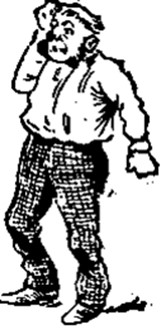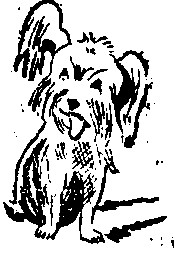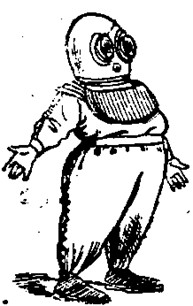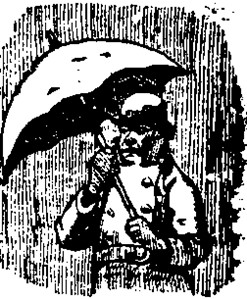This article has been transcribed from a copy of the Cardiff Times in the online collection of scanned Welsh newspapers 1804-1919 in the National Library of Wales, with grateful recognition of the free access accorded to all readers. Paragraph breaks have been introduced for easier reading.
We recognise a modern world in which ice-cream and lemonade are on sale on the streets, yet we find that gentlemen are still wearing hats (perhaps by Lincoln, Bennett & Co Ltd, hatters of Saville Row) which won’t pass under shop awnings. The references are to an American comic song, ‘It's Funny When You Feel That Way’ (G. W. Hunt, 1856), Shakespeare’s Othello (‘melting mood’ V.ii.347), the King James Bible (‘Judah and Israel dwelt safely, every man under his vine and under his fig tree, from Dan even to Beer-sheba’, 1 Kings 4:25) and a Keats sonnet, ‘To one that hath been long in city pent’. ‘Cooler’ meaning prison or a cold drink, is in bother senses a recent Americanism, while to ‘bonnet’ is to pull a man’s hat down over his eyes. Samuel now locates himself in Leeds, as is reflected in his regional language. — David Skilton

A summer costume that has been out of place up to now.
EUGH good gracious, sir, but it is ‘wahm’ ’ot, sir, ’ot, very 'ot, pipin' 'ot! — at last!!! I've been nearly frozen all the summer, and now I've to try all sorts of aids to keep myself cool; amongst other aids I've sought lemon-ade, and what is popularly known as ‘pop.’ I went to a man who was shouting, ‘Will anybody have a cooler?’ but he himself looked as hot as anybody. The last time I tried an ice-cream, a nice scream I gave when it got into my hollow double tooth, and I got a chill on my ‘stummick’ that it took no end of ‘nips’ of ardent spirits to remove. Phew, how I perspire; I quite envy that man who used to take off his flesh and sit in his bones. We were all grumbling about the cold only a few short days ago, but we are getting summary (perhaps I ought to say summery) justice now with a vengeance; we are ‘a-catchin' of it 'ot.’ I've fanned myself all this blessed day, and although it is ‘fan-ny when you feel that way,’ as the song says, yet I feel no cooler. I've been considering the subject of ‘coolers,’ sir, and trying what they and imagination would do, but a thin stream of perspiration still meanders down the bridge of my nose, and I am as limp as a rag. I, of course. know lots of cooler – but I'm not disposed to try any of them just now. When I told a friend that I lived by a canal, and that when he was passing he had better ‘drop in,’ that produced coolness – a most marked coolness. If you go and ask a friend to lend you a £5 note you usually get a cooler, not to say a damper, but I don't care about doing that to-day.

I shall certainly make one in the navy artic expedition.
I tried a walk this afternoon; I had heard of people basking pleasantly in the sun, so I walked out. Talk about basking, I fairly baked in the sun. My linen was irreproachable when I went out – it is now a pulpy mass, and my feet are covered with blisters, and the skin is peeling off my nose, and my hair resembles a dingy wet rag. My face got so red that when I stood on the railway station platform, looking up the line, all the incoming trains stopped, fancying that the danger signals were against them. I put on a light suit, of course; in fact it was a white suit when I went out. It looked like ‘pepper and salt’ (as the mixture is called) when I returned, thanks be to the town smuts.

The only inhabitant to be seen in a country place this weather.
Take my ‘tip’, avoid the sun-blinds of shops this weather. If you are wearing a top hat of the latest Lincoln and Bennett pattern, you mind that one of those sun-blinds does not bonnet you, and render your tile a mere wreck. How foolish a man looks when such a contretemps occurs – especially when he is walking out with the girl of his heart at the time. You place her in an awkward position, for she is obliged to snigger some. I hate these sun-blinds when they fall low; a tall man like myself has to go bobbing and ducking about the streets as though he were a charity child meeting a parson. And, if you have any regard for me – and for your clothes, look out for the water carts. Oh, the men in charge of those carts are funny, facetious fellows, as a rule – they just begin to play with the jets in a sudden burst as you have half-crossed the road, and are fairly behind them. And even with the passengers on the side-walks, what a nice, innocent, unadulterated, eighteen-carat fun they have. They are occasionally obliged, don’t you see, to diverge from the middle of the road, and then a swell with varnished boots, gaiters, and light trousers gets an unwelcome and involuntary shower bath, or a young lady with a freshly-worn, nicely starched white dress gets the benefit of their exuberant jocosity. They are a playful lot, the water cart men; they are always trying to throw cold water on somebody or something.

Good costume (for ‘divers’ reasons) for the average Leeds flower show.
I am most literally in the ‘melting’ mood (your knew the poetical phrase, sir, no doubt, though ‘po’try’ is not your strong point) to-day; so melting, indeed, that if this sort of thing goes on much longer I shall pack myself in ice, take to the cellar, and wait till winter. It is all a fraud sitting near the open window in a town like this. Very likely as you are reclining on the couch beneath the open window some low fellow will throw a decayed cabbage stalk and possibly even a half brick from the street below, and it will light full upon your unprotected head. I[f] this doesn't occur, you are bound to have a stiff neck or the face ache, or you give an ominous sneeze and feel that you are well in for ‘idfluenza’ – and this all through the cooling draught taken outwardly. Or a gust of wind comes and dis-gusts you by tearing your papers about and whirling them out into the streets. No open windows taken as coolers for me, thank you. ‘Why don’t you lie beneath the umbragaeous shadows of your own fig tree, and let the cool zephyrs fan your fevered brow?’ some of your readers might ask. The answer is that I haven’t got a fig tree. But I have tried lying in the manner described under the very lanky and dissipated-looking poplar (seems a very poplar tree about here) which adorns my front garden, and with what result? Well, when I had got nicely asleep, with my mouth open in the accustomed manner, two or three ear-wigs were certain to drop into the cavernous opening, and, waking suddenly, I found my coat sleeves full of spiders, a couple or so of beetles in my trousers' legs, and very likely the little boys leaving school had nearly, in their own sweet, playful way, covered me over with bits of hard mud which they had cast upon me from the street. I don't care about the umbrageous shadow business myself. The last time I reclined in this way, I woke up to find a strange dog sniffing at me. As for the zephyrs, I don't quite know what they are; they don't seem to grow about here.

This picture represents an English gentleman enjoying the summer season.
Old Sol is, after all, a nasty spitefuI humbug. I quite admit that people here in England do abuse him for about nine months in the year; I quite concede that they call him hard names and say that he is ashamed to show his face. But look at his nasty meanness – if it will bear looking at. I may say that you can't shame him by looking at him fixedly – you can't out-face him; it is true that he gets very red in the face. but he's as brazen (kindly pronounce it ‘brazzen’ as is the custom in these 'ere parts) as never was. Well, look at his nasty meanness, as I before observed. Nine months in the year he is as surely as that other planet, the Great Bear, might be expected to be; he goes (probably he is ‘on the spree’ somewhere) and sneaks off, and daren't show himself at all, and then when everybody with very righteous wrath has said what they think about him, he sudden comes out, very hot, and in a very bad temper, and takes it out of people in his own mean, spiteful way. He smiles aggravatingly at jaded business men, clerks, and others who are pent up in the grimy city; he scourges and blisters out-door labourers; he makes himself as disagreeable as possible all round. I have arrived at the conclusion, sir, that he is, when he chooses, what vulgar people call a ‘hot 'un,’ and I wipe my brow as I think of him, and I gasp out, as well as my parched tongue will allow me, a very good day to you!
Last modified 10 February 2022